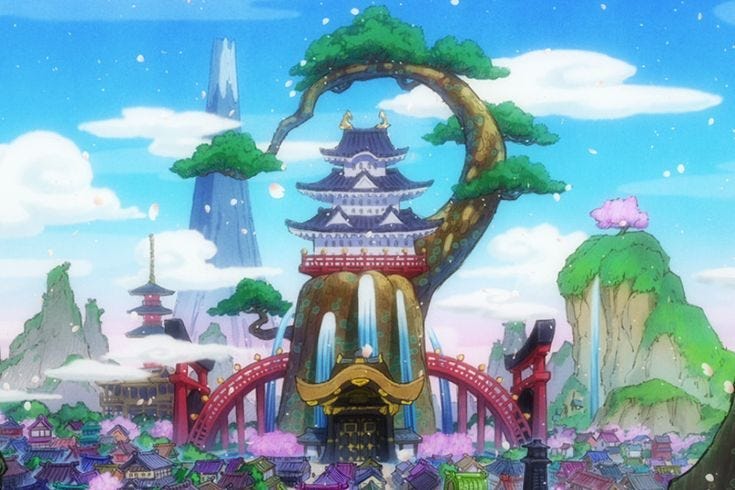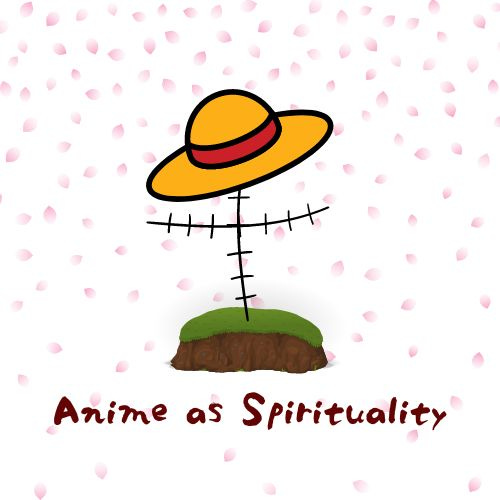Anime as Experience
It's only right that the first newsletter of the new year is inspired by my GOAT, The Animanga Christ.
Happy New Year, Same Sol no Shonen! I’m back with another newsletter that’s One Piece inspired because I’m fully locked in on my One Piece watch-through (surprise, surprise). I’ve been in the Land of Wano for 180 episodes at the time I’m writing this, and finally rounding up on the 1,000th episode (I’ll have crossed that milestone by the time you read this—yippee!)
All that’s to say, once again chat, Luffy is a spiritual titan of inspiration for this neuronerdy Substack. I look at him, how he’s written, acts in-universe, and is designed, and I learn something profound about myself from the righteously rebellious guy. Every single episode. And it’s something that sometimes Sunday Service fails to provide without the strings of guilt and shame attached.
The Spirituality of Learning.
Luffy doesn’t read, but I do, and in her article, “What Does Spirituality in Education Mean?” spirituality in education theorist Laura Jones (2005) quotes anthropologist and professor of education Paul Byers (1992), stating, “Religions are particular answers to the universal human questions about the creation and meaning of life. Spirituality refers to the universal personal concern for these questions” (p. 6). Since then, my perspective has been refined: embodying spirituality is a way of Being (London, 2023) that transforms reliance on religious orientation, language, and affiliation to foster spiritual connection (Jones, 2005) and intelligence in students of all ages. Learning and acquiring knowledge is a spiritual language and reverent posture, no matter what the subject is.
As a spiritual guidance counselor who coaches working and academic professionals, I realize that finding the balance between respecting a person's religious and spiritual beliefs while encouraging them to confront the stigmas, negative biases, and dogma that often prevent them from acknowledging polarizing and disorienting dilemmas embedded within them has been a disorienting dilemma in itself. My work through aesthetic philosophy and transpersonal spirituality compels me to hold the both/and of many things, truths, and beliefs, which can be accepted as equally valid in their own right, though they clash when confronted with real-time scenarios where lives and futures are at stake.
I’ve learned there is no one true way through the spiritual lands that lead to God or Divinity. God loves diversity. Even the most devout disciplines worship in their own different ways. I’ve seen God in many things, in many people, in everything, and in nothing at all that the Spirit was said to be in-dwelling. Even if many are on the same path, invariably, their roads will diverge based on their own quantum lives and choices. But, when the goal and who’s leading the progress is a Good Spirit—because evil is real and bad things will happen in life—following one’s path will always lead to the Land of Promise. Because the Source of one’s Spirit is there— why else would it lead you?
My magnum opus for creating this Substack and the Sol Gospel as a learning and SMB integration platform is to ingratiate my audience with my special interests through ✨learning.✨ Using excerpts from recommended readings, I request the reader’s permission to use this newsletter to detail how learning about spirituality in education and fostering transformative learning, as well as the spiritual framework of adult education, introduced me to educational frameworks, perspectives, and approaches in my pursuit of transcending religion to spiritualize the secular. Through my reflections, I will share how the crystallization of the philosophical and theoretical foundations of teaching embodied spirituality has been integral to my emotional, spiritual intelligence, and mindfulness growth. These spiritual perspectives have guided my somaesthetic choices for my spiritual, personal, and professional goals and have given me transformative experiences that have shaped and informed my philosophical pedagogy.
Anime as Experience.
I mean, just take a quick scroll through this Substack. I love anime. And I love the philosophy and psychology of spirituality so much that blending these special interests is how I have chosen to share my knowledge. I have seen the threads of spirituality in the Japanese animation and storytelling I’ve been watching; I’ve been watching anime all my life. Goku’s spiritual practice and journey in Dragon Ball Z was the first time I saw my family’s prayer life reflected in media. Naruto is why I even started exploring the spirituality of anime from a psychological perspective. But it was during this long season of autistic burnout that Monkey D. Luffy’s free and stubborn way of life saved my spirit from crashing the fuck out.
I’ve written about this impact once or twice…maybe even three times before, and even recorded the inaugural Anime as Spirituality Podcast episode about it. (Give it a listen if you can so I can get better podcast editing equipment). One Piece, but more so Luffy (and Eiichiro Oda’s humane and spiritual-sociopolitical storytelling), gave me a new perspective on how to make it through this arc of life. It was precisely when I was in the late-100s and mid-300s episodes. And Luffy is battling the big bad of Skypeia and Thriller Bark. And he’s relentless; he keeps bouncing back because he’s made of rubber, but also because he assumes this indomitable beastly role to save people and stop evil. Even when he’s smacked down, he bounces back; even when he must consume a hundred lost souls, he carries the weight of a relentless will to live, win, and be free (and I took that personally)—it saved me.
I seek to contribute cognitive and spiritual reframes to our discussion topics, intuitively adopting a general process that London (2023) implies is “a transformative approach to education from a spiritual perspective” in secular education. By employing what London describes as “an approach based on an integration of cognitive developmental/constructionist theory with principles of spiritual psychology from a variety of spiritual traditions”, I have found a way to secularize spiritual understandings without infringing on others’ personal spiritual beliefs.
Learning about educational approaches that reframe cognitive beliefs through spiritual perspectives and foster a foundational relationship with students' inner lives proved that spiritual principles can be successfully integrated into school curricula, irrespective of an educator’s or student’s religious beliefs and influence. I recently watched a CBS news special about spirituality in society—separate from a religious community—and a California university chaplain discussed the ability and need to secularize spirituality. His argument supported what I have come to understand is the most important and meaningful part of a person’s spirituality: there is peace and joy to be found in building the foundation for a rich and sacred inner life that is authentic to who they are and what they want to be (London, 2023).
Sounds like freedom to me.
Learning to Live Freely.
Like Luffy and the Straw Hats, individual and collective spirituality is about embodying freedom.
Freedom through self-acceptance.
Freedom through liberation.
Freedom through global solidarity.
Freedom through transcendence.
I headcanon Luffy as a Sagittarius ascendant/rising in the 9th house for this very reason. It’s how I see the world: focusing on connecting philosophy and justice to spirituality because teaching the art of embodying spirituality through creative arts and aesthetic education is soul work. Spiritual perspectives and frameworks can be integral to students’ learning and prevent students of different religious backgrounds, agnostic or atheist, from feeling pressured or guilty for not performing religion in school. Within anime, I immediately realized that character identification through spiritual gifts and vicarious experiences could give me an edge over difficult life experiences and my sensory issues.
Transformative Learning comes down to this: people make better choices and love themselves more when they learn how to make decisions that stir their souls and enlighten their spirits, especially regarding what they learn. When I started using this lens with clients and family members (none of my friends watch anime, lol) and saw it was working, I asked myself, “Can spirituality earnestly be discussed without mention of religion and still lend itself well to discussing spiritual perspectives and frameworks in secular environments?”
The spirituality I am interested in teaching is a creative, inspired, inclusive, yet discerning force in any aspect of a person's life that provides Help (London, 2023, p. 8) in times of trouble or curiosity. They can learn and pursue what they desire while remaining grounded and aligned with the spirit and the higher power guiding them outside of organized religion while performing and participating in organized religion.
Thus, Anime as Experience: for Black, Queer, and Neurodivergent Souls of Color learning cohort program was designed.
A six to eight-week psychospiritual cohort journey utilizing the aesthetic experience of shonen anime to learn, heal, and grow within a multicultural, neurodivergent community. Join a small crew of like-minded individuals seeking personal growth for an immersive eight-week journey designed for neurodivergent individuals from Black and brown communities. This unique virtual cohort blends spiritual and emotional coaching through a central focus on one anime's powerful narratives and themes. Experience healing and personal growth in a supportive and understanding environment. Cohorts are limited to 10 crew members at a time.
The collective strive for justice and spirituality in education is a commitment to “calling the spirit” into everyone’s learning experience, and it is possible to do so without imposing on another’s spiritual tradition. bell hooks said that there are places and times when being spiritually forward is both impossible yet necessary. Impossible yet necessary sounds like danger to me. The persecution of which is not easy to avoid.
Secularizing the Spirit through Solidarity
Yet, my passion for the Spirit and secularizing how one comes to and engages with Divinity is driven by confronting religious dogma and manipulative indoctrination through the exploration of Truth, Beauty, and Justice. For me, Anime as Experience = Anime as Spirituality. In searching for language, techniques, and philosophical perspectives that create and foster spiritual views in the secular world without imposing religious beliefs or indoctrination on others, more people can trust themselves to make sounder decisions in life and society. It is the most inclusive and transformative act a person can bring into a shared space. It transforms the space from secular to sacred without imposing religious ideologies or indoctrination on people outside the belief system. This perspective, to me, is the cornerstone of spirituality in education.
If you would like to learn how to do so from me, you can book a session with me at the link: www.thesolgospel.com!










